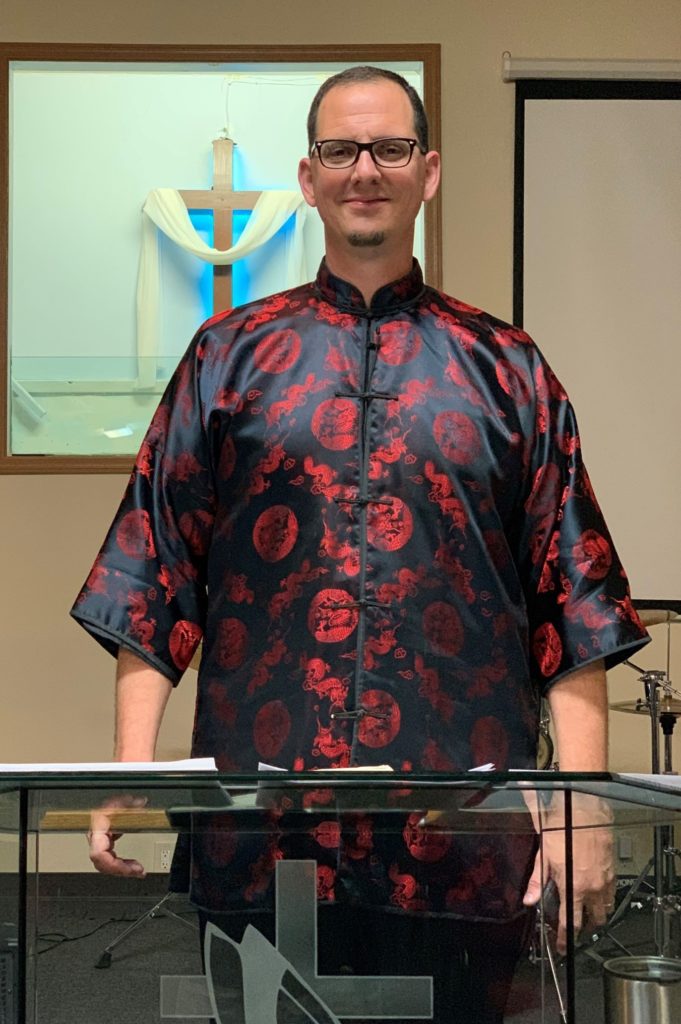How did I became the pastor of a Chinese church in Tucson?
Five years ago, my wife, four kids, and I stepped off the plane in Atlanta and into the great unknown. We were transitioning back after serving almost 20 years in mainland China, and we weren’t sure if we’d ever go back. We were convinced that we were supposed to be back in the States, but at that point we weren’t sure for how long.
The transition over the next few years could only be described as a season of wandering. I wrote about the first few years of that transition for ChinaSource a few years ago in “Of Returns and Runways.”
After it became clear that we should not return to China with our organization, we pursued multiple options during our wandering. My desire was to become a pastor, but as I mentioned in the transitions article, many supporting church leaders discouraged us from pursuing that direction. So, I put that dream on the altar and kept looking for God’s direction.
We briefly considered working with another organization supporting the church in China while living in the States, but eventually decided that wasn’t the best fit. We then jumped into a small campus ministry opportunity working with Chinese visiting scholars. The ministry was hard. Raising support for it was even harder.
After a year of financial struggles, in desperation, I started looking for other jobs in order to provide for my family. I asked a friend from China if he’d be willing to serve as a reference for me. He asked if I had considered becoming a pastor, because he thought I’d be good at it. When I told him about my desires and the previous church leaders’ objections, his response altered the course of our lives. He said:
So you’re telling me that it is impossible for God to make you a pastor in the United States? I’ll be a reference for you if you agree to pursue the role of a pastor.
So I took a leap of faith. And I started praying, “Lord, make me a pastor!” I sent out more than 60 applications and went through the interview process with several churches, but the doors just weren’t opening.
Then one night we were hosting visiting scholars at our house in Alabama when my phone rang. It was the search committee chair for Tucson Chinese Baptist, calling “out of the blue” for an initial interview. We worked through the process with the search committee over the following weeks. My wife and I flew out to Tucson a few weeks later for a full weekend of meetings, Q&A, and preaching two services; in English and then again in Mandarin. The visit went well, and we went back to Alabama and waited.
When the call came to move to Tucson a few weeks later, the paradox of following God’s lead and uprooting our family once again brought joy and sorrow. It was not easy to leave another life we had built and follow God into the desert.
What it’s like being a “laowai” pastor of a Chinese church in Tucson?

Like everyday life in China, the answer to this question is complex. I’m also more convinced than ever that you can’t stereotype Chinese American churches any more than you can truly stereotype any other local body of believers. And besides, we’re all “laowai” in America anyway.
Our church is a multi-cultural, multi-generational, multi-language church. The oldest members are immigrants from Hong Kong or Toysan (Taishan), Guangdong. Many opened small grocery stores and began raising their families after immigrating to Tucson. During the mid-70s, two stateside-based missionaries would come and pick up the kids and take them to our church. Those kids grew up speaking Cantonese at home, English everywhere else, and worshipping in English. Later, their parents started coming to church too.
So we have two services every Sunday. The first, largest, and most diverse service is in English. In addition to Chinese Americans, we have Koreans, Indonesians, Filipinos, and a few other ethnicities attend. Our second service is held in Mandarin and Cantonese, with line-by-line translation throughout the service. Every other month we have a combined service with communion.
The most common question I get when I tell people where I serve is: “You’re the pastor of a Chinese church?” The follow-up question is “Do you have to be Chinese to come?” I usually respond with “They let me come every week!”
Pastoring a Chinese American church has been an adjustment. I’ve had church members tell me “You’re more Chinese than we are!” While this might seem true, especially when compared with younger members, I can still see deep influences from Chinese culture in our congregation. Even in the youngest members!
Most of my challenges stem from linguistic, cultural, and political differences. I’m discovering that mainland Mandarin vocabulary and phrases are different than Mandarin spoken in Taiwan, Hong Kong, and among Chinese diaspora communities. I certainly can’t crack jokes quoting Chairman Mao or referencing mainland norms nearly as much during my sermons. And there are cultural nuances that I’m adjusting to as well.
I’ve been told that the word order between Mandarin and Cantonese is significantly different. Probably the biggest challenge is preaching and teaching in Mandarin while having someone translate line by line into Cantonese. It can become easy for everyone to lose focus along the way!
Another personal challenge is switching from the simplified characters that I learned in mainland China to the traditional style that my Chinese congregation all read. I usually write my sermons in English, then translate and edit them using simplified characters for my Chinese notes. Then I use Google translate to get the sermon notes from simplified to traditional characters before creating the power point slides and sending notes to my Cantonese interpreter. I am so thankful for my congregation’s patience and grace as we learn how to follow the Lord together!
These challenges and the steep learning curve are all worth it! It has been rewarding to worship and study God’s word together in multiple languages. It is exciting to watch how God is transforming lives. And God continues to stretch and grow me through this process too!
What does God continue to teach me?
Leading a multi-ethnic, multi-generational, multi-language church has taught me many things over the last two and a half years. I think these truths are critical not just for Chinese American churches, but all our gatherings as local bodies of believers around the world.
Our world desperately needs to see believers who have a firm grasp on who they are in Christ. We must find our identity in Christ first. Not a race or ethnicity. Not a particular job or role. Not in how well we do in school or which university we attend. We need to hear, believe, and live out the truth that who we are in Christ defines us more than these other adjectives. The other descriptors are important, but they must all take a seat behind our lives in Christ and for Christ.
Next, leading this congregation has helped clarify the importance of shoring up a biblical foundation and a biblical worldview. Any church can easily fall into the trap of “Jesus+.” Jesus plus some cultural perspective, tradition, or personal baggage. Chinese American churches are not immune to this trap, so my goal since coming has been to focus on “Christ crucified.”
We are pursuing church revitalization through time in God’s word, worship, prayer, and fellowship with one another. We’re focusing on expository preaching and Bible study. We’re focusing on learning to share our testimony and the gospel. A small group has also started learning the Gospel Coalition’s “New City Catechism” together. A biblical, gospel-driven foundation is critical for every believer, regardless of background.
Finally, I am thankful that God continues to lead our congregation with a new vision. We are Tucson Chinese Baptist Church, or “TCBC” for short. And that is our new vision for this local body of believers too:
“TCBC, TCBC”
“Teaching Christ, Becoming Christlike. Taking Christ Beyond Church.”
This is a vision that transcends our generation, language, ethnic or cultural gaps. It is a vision for us individually, as a church, for our city, and to the ends of the earth.
So, that’s the short version of life as a former overseas worker, who by God’s grace moved to Tucson to become a “mushi” and “muksi (Cantonese)” for a Chinese American congregation. In this article I’ll spare you the multitude of language and cultural mistakes I continue to make while leading this flock and preaching in two languages each week. Maybe we’ll cover that in a future post.
I often try to remind myself and my congregation that we walk by faith, and not by sight. That was true while crossing the street in mainland China, and it remains true wherever we live today.
All images courtesy of the author.

Jason Ingle
Jason Ingle is Senior Pastor of Tucson Chinese Baptist Church in Tucson, Arizona. After serving almost 20 years in mainland China, and then sweating in the southeastern part of the US for a few years upon reentry, he is still trying to get used to the dry heat. You can contact …View Full Bio
Are you enjoying a cup of good coffee or fragrant tea while reading the latest ChinaSource post? Consider donating the cost of that “cuppa” to support our content so we can continue to serve you with the latest on Christianity in China.